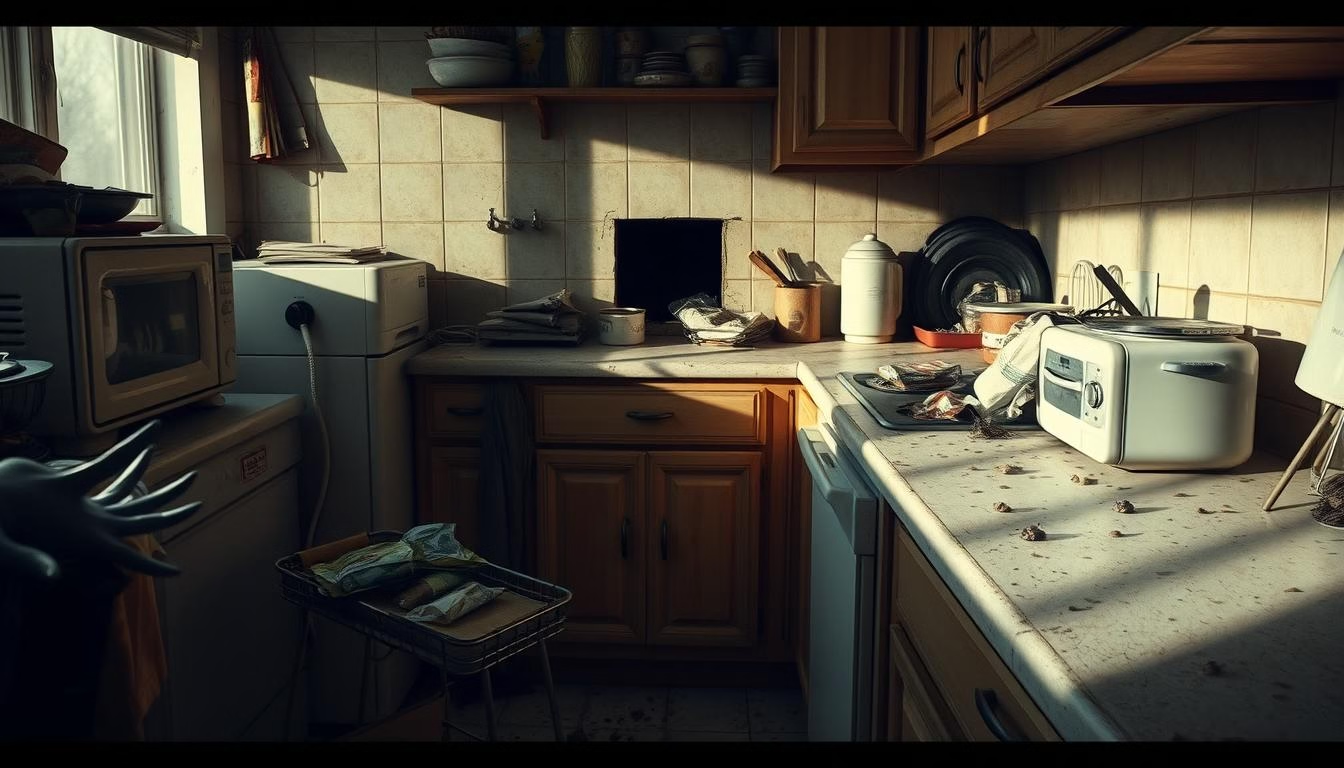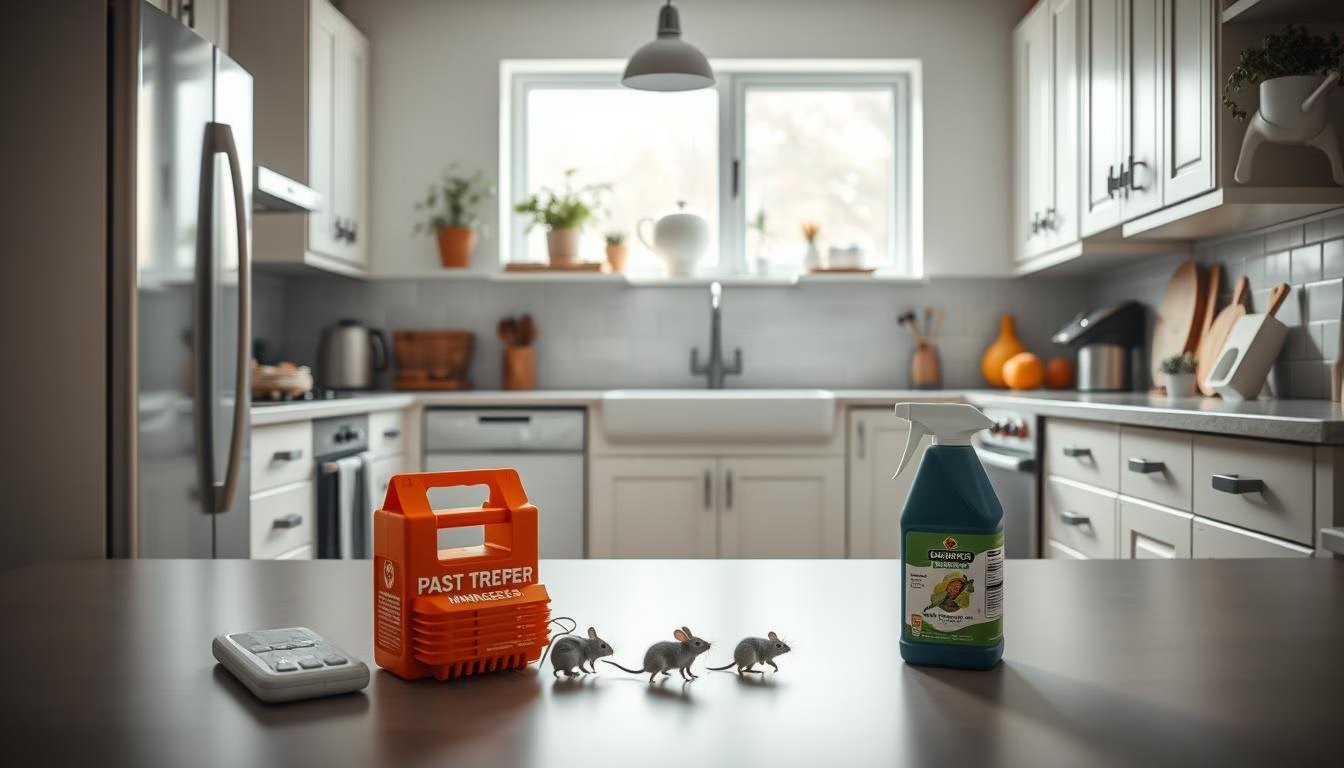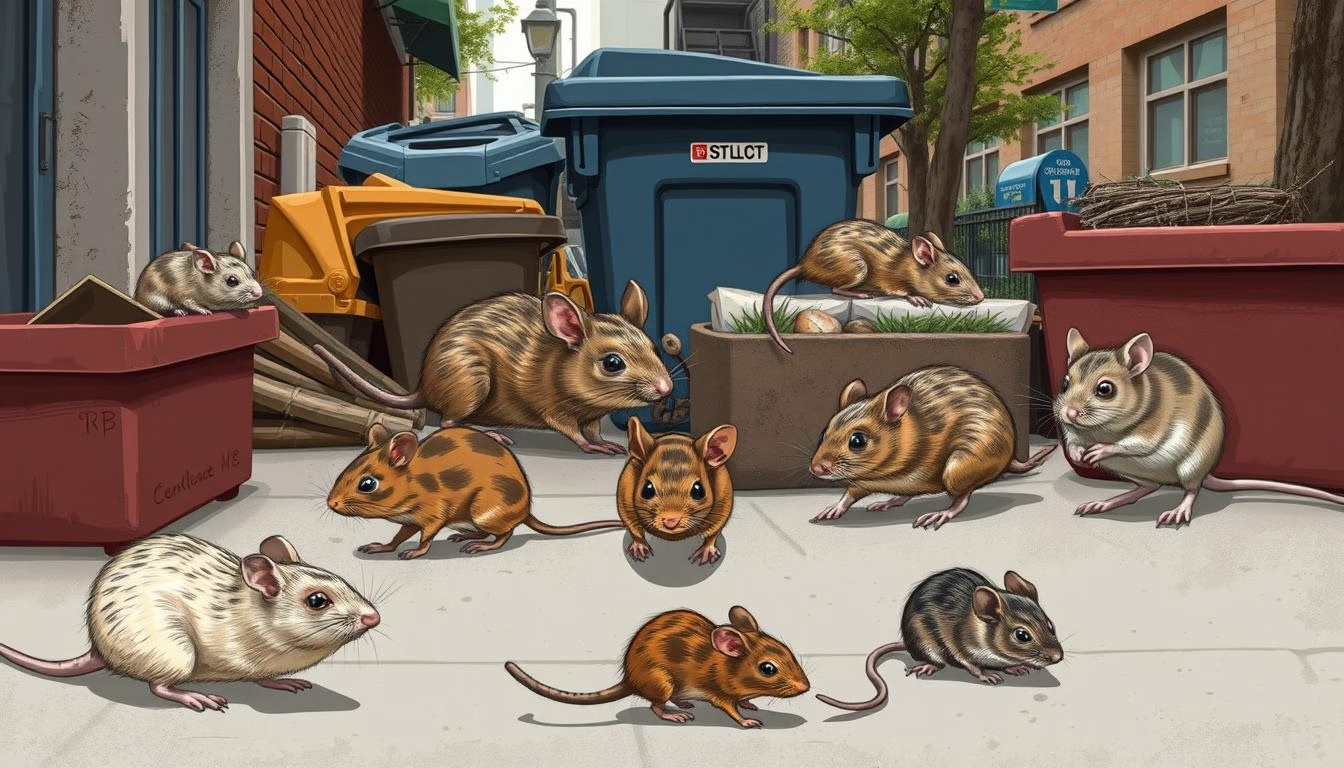Mice might look harmless, but they can be a big health risk in our homes. It’s important for homeowners to know the dangers mice can bring. This article will explain the health risks mice pose and how to protect your family and home.
Key Takeaways
- Mice can carry and transmit various diseases that can be harmful to human health.
- Mouse infestations can lead to the contamination of food and water supplies, posing a significant health risk.
- Mice can cause structural damage to buildings and property, leading to costly repairs.
- Understanding the signs of a mouse infestation and taking prompt action is essential to mitigate the risks.
- Effective rodent control strategies, including prevention and professional pest management, can help eliminate the dangers posed by mice.
The Importance of Addressing Mice in Your Home
Mice might seem harmless, but they are a big problem. They can cause pest management, property damage, and disease transmission issues. Ignoring a mouse problem can harm your family’s health and your home’s structure.
Mice can spread diseases like hantavirus and leptospirosis. They can contaminate food and water, putting your family at risk. Their gnawing on wires and insulation can also cause property damage. This can lead to electrical fires and weaken your home’s structure.
- Mice can transmit diseases that are harmful to human health
- Their chewing behavior can cause significant property damage
- Mice infestations can negatively impact the value of your home
It’s crucial to tackle a mouse problem quickly. Using pest management strategies and getting professional help can get rid of them. This keeps your home and family safe and healthy.
“Mice are more than just a nuisance – they can pose serious threats to your health and home. Taking proactive steps to address an infestation is crucial for the safety and well-being of your family.”
Common Species of Mice in Urban Areas
Understanding the different mouse species in cities is key to controlling them. We’ll look at the House Mouse, Deer Mouse, and Field Mouse, the most common urban mice.
House Mouse
The House Mouse is everywhere in cities. They are small, grayish-brown, and great at climbing. They love being near people and can live in walls, attics, and even appliances.
Deer Mouse
The Deer Mouse is less common in cities but can still be found. They have white bellies and big, round eyes. They carry diseases like hantavirus and prefer rural or woodland areas.
Field Mouse
The Field Mouse, or Meadow Mouse, is small and brownish-gray. They sometimes enter cities for food and shelter. They like grassy areas but can also be found in gardens, parks, and city buildings.
Knowing the differences between these urban mice species helps in rodent identification. This knowledge lets homeowners and pest control experts tackle mouse problems more effectively.
Health Risks Associated with Mice Infestations
Mice in our homes bring more than just unwanted guests. They pose serious health risks. From triggering allergies and asthma to spreading dangerous diseases, their presence can be harmful. It’s important to understand these risks to tackle the problem effectively.
Allergies and Asthma
Mice can make breathing problems like allergies and asthma worse. Their dander, saliva, and droppings contain proteins that can trigger allergic reactions. These reactions can cause sneezing, itching, and trouble breathing.
Being exposed to these particles can also irritate the airways. This can lead to asthma attacks and other breathing problems.
Diseases Transmitted by Mice
- Hantavirus Pulmonary Syndrome (HPS): A severe and potentially fatal respiratory disease caused by exposure to infected mouse urine, droppings, or saliva.
- Leptospirosis: A bacterial infection transmitted through contact with mouse urine, which can lead to liver and kidney damage.
- Salmonellosis: A foodborne illness caused by the consumption of contaminated food or water due to mouse fecal matter.
Contaminated Food and Water
Mice can contaminate food and water with their droppings, urine, and saliva. This can spread harmful bacteria like Salmonella and E. coli. These bacteria can be dangerous for anyone who eats or drinks tainted items.
The risks of mice infestations are serious and can affect the health of your household. It’s crucial to address these issues quickly and effectively. This will help keep your home safe and healthy.
Signs of a Mice Infestation
Spotting early signs of mice is key to stopping them before they get out of hand. These sneaky rodents can be hard to find, but their signs are clear. Here are the common signs of a mice problem in your home.
Droppings and Urine Marks
Mice droppings are a clear sign of their presence. These small, dark pellets show up in places mice like, like baseboards and near food. You might also see yellowish-brown urine stains.
Chewing and Gnawing Damage
Chewing marks are another sign of mice. Their strong teeth chew on wood, wires, and plastic. Look for small holes and rough edges on items and your home’s structure.
Nesting Materials
Shredded paper or soft materials in hidden spots might mean mice have made a nest. They gather these materials to build a cozy home for themselves and their young.
Watching for these signs can help you act fast to keep your home safe. This way, you can avoid health risks from these unwanted visitors.
How Mice Affect Your Home Environment
Mice might seem cute, but they can really mess up your home. They can damage structures and leave bad smells. This can cost you a lot of money.
Structural Damage
Mice love to chew, and they can harm your home’s structure. They might chew on insulation, wiring, and even the frame. This can lead to expensive repairs and safety risks. It’s not just a hassle; it can also hurt your home’s value.
Odor Problems
Mice breed a lot, and their pee and poop can smell bad. These smells can fill your home. It’s hard to get rid of them and can make your air quality worse. This makes your home less welcoming.
Impact on Property Value
Having mice in your home can lower its value. Buyers might not want a house with mouse problems. This can make selling your home harder and lower its price. It can hurt your wallet.
It’s important to deal with mice in your home. It’s good for your health and your home’s future. Knowing how mice can harm your home helps you take action. This way, you can keep your home safe and enjoyable.
Mice Behavior and Social Structure
To manage mice well, knowing their behavior and social life is key. They have unique ways of finding food, nesting, and breeding. This knowledge helps homeowners and pest control experts.
Foraging Habits
Mice are always looking for food. They use their smell and sight to find it. They like crumbs, spilled grains, pet food, and more. They mostly forage at night when it’s quiet.
Nesting Preferences
Mice are good at making homes in different places. They like warm, hidden spots near food and water. They nest in walls, attics, basements, and even in appliances. They use paper, insulation, or fabric to make cozy nests for their babies.
Reproduction and Lifespan
Mice breed a lot, with up to 12 babies at a time. They have babies in just 19-21 days. This means their numbers can grow fast. Mice live about 12-18 months, but their quick breeding keeps their numbers steady.
Knowing how mice behave and live together helps us fight infestations better. This knowledge leads to better ways to keep rodents away. It keeps people and homes safe and healthy.
Preventive Measures to Keep Mice Away
Mice can be a big problem in homes, causing health issues and damage. Luckily, there are steps you can take to keep them away. Sealing entry points and using natural deterrents are key to a mouse-free home.
Seal Entry Points
Mice can fit through tiny openings. It’s important to find and seal these spots. Check your home inside and out. Use caulk, steel wool, or other materials to block openings that are bigger than a pencil.
Maintain Cleanliness
Keeping your home clean can also keep mice away. Rodent proofing your space means storing food in sealed containers. Clean up crumbs and spills often. Remove clutter to make your home less inviting to mice.
Use of Natural Deterrents
- Plant mint, lavender, or other herbs around your home. Mice don’t like these smells and will stay away.
- Use cotton balls soaked in peppermint oil in areas where mice are seen. The scent will keep them out.
- Spread cayenne pepper or ground black pepper around entry points and where mice are spotted. They don’t like the smell or taste.
By taking these steps, you can lower the chance of mice in your home. This helps keep your living space healthy and free from pests.
Effective Rodent Control Strategies
Homeowners often face a choice between traps and poisons for mouse control. Traps are humane, allowing mice to be moved away. Poisons are quicker but risk harming other animals or pets.
Traps vs. Poison
Traps are a better choice for those who want a humane solution. They catch mice alive, so you can release them safely. This is kinder than poisons, which can be painful.
Hiring a Pest Control Expert
For big mouse problems, getting a pro is best. Experts can quickly find and fix the issue. They use the right methods for your home.
Eco-Friendly Control Methods
- Natural things like peppermint oil or cayenne pepper can keep mice away without harm.
- Sealing holes and keeping your home tidy stops mice from getting in.
- Ultrasonic devices make sounds mice don’t like but are safe for people and pets.
Trying different rodent control methods helps solve mouse problems safely. This keeps your family, pets, and the planet safe.
What to Do If You Find Mice in Your Home
Seeing mice in your home can be scary, but staying calm is key. Acting fast is crucial to handle the problem and stop it from getting worse.
Immediate Actions
If you see mouse signs like droppings or chewed areas, act quickly. Look around your home to find where mice are getting in and where they might be hiding. Fix any holes or gaps to keep them out. Also, clean up any food to make your home less appealing to them.
- Conduct a thorough inspection of your home to identify entry points and nesting areas
- Seal any cracks, gaps, or openings that could allow mice to enter
- Remove food sources by storing items in airtight containers and cleaning up spills
When to Seek Professional Help
For small mouse problems, you might be able to handle it yourself. But, if the issue keeps coming back, it’s time to get help from pest control experts. They have the skills and tools to get rid of mice for good.
| Situation | Recommended Action |
|---|---|
| Persistent mouse activity despite your DIY efforts | Hire a professional pest control service |
| Signs of a large-scale mouse infestation | Seek professional mouse infestation response |
| Concern about potential health risks or structural damage | Consult a professional for effective DIY rodent control or pest management |
By acting fast and getting help when needed, you can keep your home safe from mice. This protects your family and your home from the dangers mice can bring.
The Cost of Mice Infestation
Mice might seem harmless, but they can cost a lot. They cause property damage and health issues. It’s important to deal with them quickly.
Financial Implications
Mice are known for their destructive habits. They chew on things like wiring and insulation. This can lead to expensive repairs.
Dealing with mice also means spending on pest control. You might need to hire professionals or buy traps. This adds to the cost.
Health Care Costs Associated
Mice can make people sick. Diseases like hantavirus and salmonellosis can be costly to treat. This includes hospital bills and long-term care.
They can also make breathing problems worse. This can lead to more doctor visits and higher bills.
Dealing with mice early can save money and health problems. It’s a smart move for homeowners.
Conclusion: Taking Action Against Mice Risks
In this article, we’ve looked at the health risks mice bring. These include allergies, diseases, and damage to your home. It’s important to act fast to protect your health and property.
Knowing the signs of mice and stopping them before they start is key. Seal holes, keep your place clean, and use natural repellents. If mice are already there, use traps or get help from experts.
Your family’s safety and your home’s condition rely on you watching out for mice. Stay informed and take steps to keep rodents away. This way, you can protect your home and health, making your living space safer.



